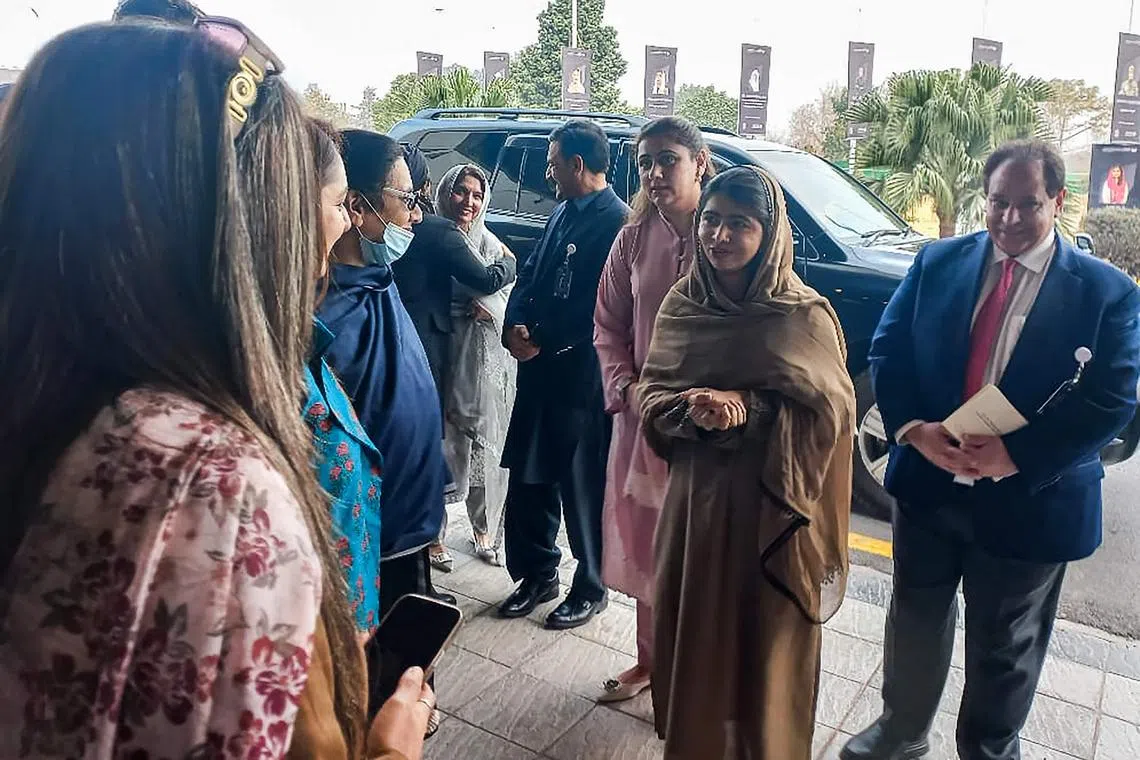Nobel laureate Malala Yousafzai tells Muslim leaders not to ‘legitimise’ Taliban
Sign up now: Get ST's newsletters delivered to your inbox

Nobel Peace Prize Laureate Malala Yousafzai (second from right) in Islamabad on Jan 11.
PHOTO: AFP
Follow topic:
ISLAMABAD – Nobel Peace Prize laureate Malala Yousafzai urged Muslim leaders on Jan 12 not to “legitimise” the Afghan Taliban government and to “show true leadership” over their assault on women’s rights.
“Do not legitimise them,” she said at a summit on girls’ education in Muslim nations being held in Pakistan’s capital, Islamabad.
“As Muslim leaders, now is the time to raise your voices, use your power. You can show true leadership. You can show true Islam,” said Ms Yousafzai, 27.
The two-day conference has brought together ministers and education officials from dozens of Muslim-majority countries, backed by the Muslim World League (MWL).
Since sweeping back to power in 2021, the Taliban government has imposed an austere version of Islamic law that the UN has labelled “gender apartheid”.
Afghanistan is the only country in the world where girls are banned from secondary school and university. Delegates from its Taliban government did not attend the event despite being invited, Pakistan Education Minister Khalid Maqbool Siddiqui told AFP on Jan 11.
“Simply put, the Taliban do not see women as human beings,” Ms Yousafzai told the conference.
“They cloak their crimes in cultural and religious justification.”
Mr Muhammad al-Issa, a Saudi cleric and MWL secretary-general, told the summit on Jan 11 that “those who say that girls’ education is un-Islamic are wrong”.
Ms Yousafzai also highlighted the impact of wars in Yemen, Sudan and Gaza on schooling.
“In Gaza, Israel has decimated the entire education system,” she said. “I will continue to call out Israel’s violations of international law and human rights.”
Pakistan’s state-owned PTV channel censored a portion of her speech, which alluded to a mass deportation scheme by Islamabad that was launched in 2023 and which has seen hundreds of thousands of Afghan nationals leave under threat of arrest.
“I cannot imagine an Afghan girl or an Afghan woman being forced back into the system that denies her future,” she told the conference in remarks cut from the air.
Ms Yousafzai was shot in the face by the Pakistani Taliban when she was a 15-year-old schoolgirl in 2012, amid her campaigning for female education rights.
Her activism earned her the Nobel Peace Prize in 2014, and she has since become a global advocate for women and girls’ education rights.
While there is outcry in much of the international community over the Taliban government curbs, nations are divided over how to engage with Kabul’s rulers on the issue.
Some countries argue they should be frozen out of the diplomatic community until they backtrack, while others prefer engagement to coax them into a U-turn.
No country has officially recognised the Taliban authorities, but several regional governments have engaged on the topics of trade and security.
There is little evidence that broadsides from the international community over the Taliban government’s treatment of women are having any impact on their position.
Ms Yousafzai’s father, Mr Ziauddin Yousafzai, who pushed against cultural norms for his daughter to go to school in Pakistan and co-founded her Malala Fund charity, on Jan 11 told AFP he had not seen “any serious step or serious action from the Muslim world” on the cause of girls’ education in Afghanistan.
Ms Roza Otunbayeva – head of the United Nations Assistance Mission in Afghanistan – said leaders of Islamic countries should offer direct help to Afghan girls.
“I really call on all these ministers... who came from all over the world, to offer scholarships, to have online education, to have all sorts of education for them,” she told a panel. AFP

